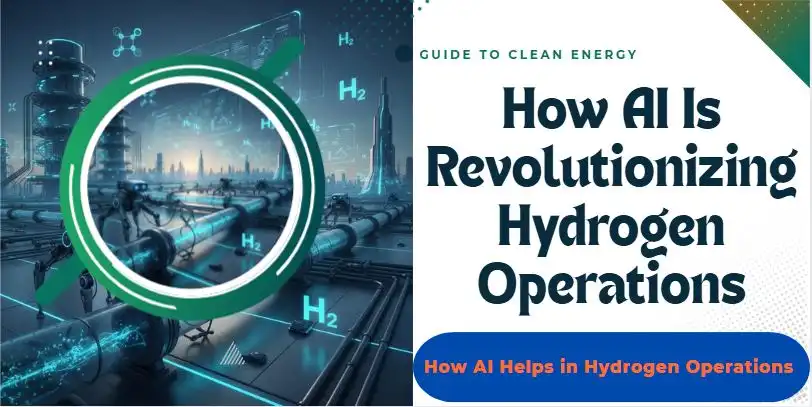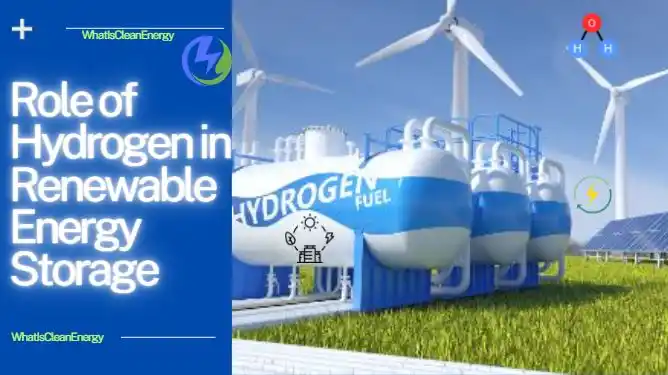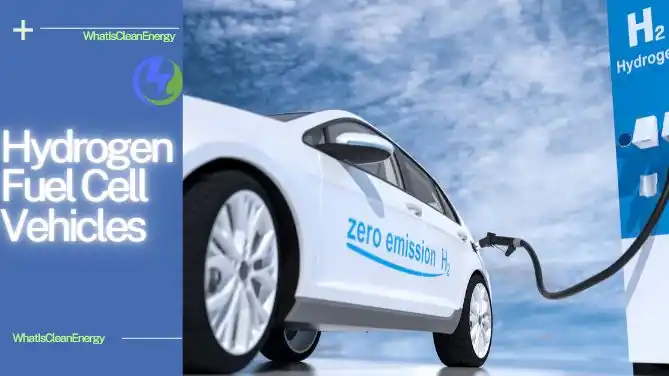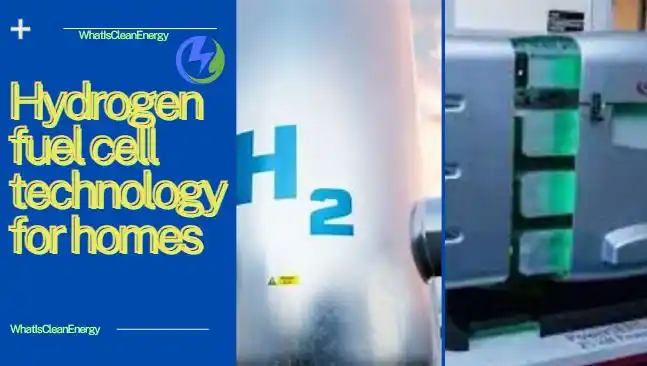Hydrogen is emerging as a key player in the transition to clean energy, valued for its lightweight properties, high energy density, and zero emissions at the point of use. However, challenges remain in its production, storage, and utilization. This is where Artificial Intelligence (AI) plays a transformative role, offering innovative solutions to optimize and streamline hydrogen technologies. AI is like a smart assistant. It helps people and machines make better decisions. AI in hydrogen operations is helping companies save money, reduce waste, and make clean energy more reliable.
Let’s explore how AI is changing the hydrogen world.
What Is Hydrogen Energy?
Hydrogen is the most common element in the universe. It’s found in water (H₂O), natural gas, and even plants. When we separate hydrogen from these sources, we can use it as fuel.
Why Hydrogen Is Special
- It doesn’t release carbon dioxide when burned.
- Hydrogen can power cars, buses, and even airplanes.
- It stores energy for later use, like a battery.
But hydrogen needs to be made, stored, and moved safely. That’s where things get tricky.
What Is AI?
AI stands for Artificial Intelligence. It’s a type of computer program that learns from data and makes smart decisions.
Examples of AI You Know
Everyday AI Applications
- Virtual Assistants: Siri, Alexa, and Google Assistant use natural language processing to understand and respond to voice commands.
- Recommendation Systems: Netflix, YouTube, and Spotify suggest content based on your preferences and behavior.
- Smart Home Devices: AI powers thermostats like Nest, which learn your habits to optimize energy use.
AI in Healthcare
- Medical Imaging Analysis: AI enables radiologists to detect diseases, such as cancer, with high accuracy from X-rays and MRIs.
- Drug Discovery: Algorithms accelerate the identification of potential drug candidates by analyzing vast datasets.
- Predictive Diagnostics: AI models forecast patient risks based on health records and genetic data.
Transportation using AI
- Autonomous Vehicles: Companies like Tesla and Waymo use AI for self-driving technology, including object detection and decision-making.
- Traffic Management: AI systems optimize traffic flow and reduce congestion in smart cities.
Energy & Environment
- Smart Grid Management: AI predicts energy demand and balances supply in real time.
- Renewable Energy Forecasting: Algorithms forecast solar and wind energy output to improve grid reliability.
- Hydrogen Optimization: AI models enhance hydrogen production efficiency, monitor storage conditions, and predict maintenance needs.
Industry & Manufacturing
- Predictive Maintenance: AI detects equipment anomalies before failures occur, reducing downtime.
- Quality Control: Machine vision systems inspect products for defects with precision.
- Supply Chain Optimization: AI forecasts demand and streamlines logistics.
In hydrogen operations, AI helps engineers and scientists solve problems faster and smarter.
How AI Helps in Hydrogen Operations
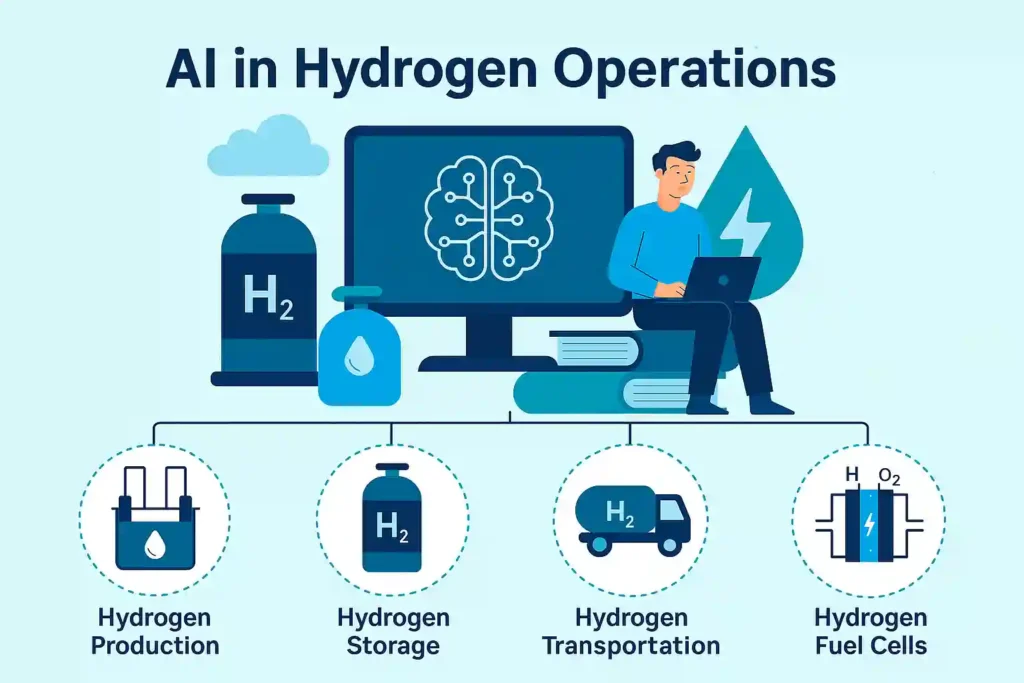
Let’s break it down into simple parts.
1. AI in Hydrogen Production
Hydrogen is made using machines called electrolyzers. These machines split water into hydrogen and oxygen using electricity.
Problems in Production
- Electrolyzers can overheat.
- They use a lot of electricity.
- Sometimes they produce less hydrogen than expected.
How AI Helps
- AI watches the machines in real time.
- It predicts when a machine might fail.
- It adjusts settings to save energy and increase hydrogen output.
Example: AI can tell if the water is too hot or too cold and change the temperature automatically.
2. AI in Hydrogen Storage
Hydrogen is stored in tanks or underground spaces. But it’s a very light gas and can leak easily.
Problems in Storage
- Leaks are dangerous.
- Tanks can get damaged.
- It’s hard to know how much hydrogen is left.
How AI Helps
- AI uses sensors to detect leaks early.
- It monitors pressure and temperature.
- It tells operators when to refill or repair tanks.
Bonus Tip: AI can even suggest better materials for tanks based on past data.
3. AI in Hydrogen Transportation
1. Route Optimization for Hydrogen Delivery
- AI algorithms analyze traffic patterns, fuel consumption, and delivery schedules to optimize routes for hydrogen tankers.
- This reduces transportation costs and minimizes carbon footprint.
2. Real-Time Monitoring and Safety
- AI-powered sensors and computer vision systems detect leaks, pressure anomalies, and temperature fluctuations in hydrogen storage and transport systems.
- Machine learning models predict potential failures, enabling proactive maintenance and reducing safety risks.
3. Fleet Management and Predictive Maintenance
- AI helps manage hydrogen-powered vehicle fleets by forecasting maintenance needs based on usage patterns and sensor data.
- This ensures reliability and extends the lifespan of vehicles and infrastructure.
4. Energy Demand Forecasting
- AI models predict hydrogen demand across regions and timeframes, helping optimize supply chain logistics and refueling station placement.
5. Integration with Renewable Energy
- AI coordinates hydrogen production and transportation with renewable energy availability (e.g., solar or wind), ensuring efficient use of clean energy sources.
6. Autonomous Hydrogen Vehicles
- Advanced AI systems are being developed for autonomous hydrogen-powered vehicles, combining clean energy with smart mobility solutions.
Challenges and Opportunities
- Data Quality & Standardization: AI systems require high-quality, real-time data, which is still limited in hydrogen infrastructure.
- Regulatory Hurdles: Safety and compliance standards for AI in hydrogen systems are evolving.
- Computational Demands: Real-time AI applications in transportation require robust processing capabilities.
Trucks, pipelines, or ships move hydrogen. It needs to be handled carefully.
Problems in Transport
- Long routes waste fuel.
- Traffic delays delivery.
- Accidents can happen.
How AI Helps
- AI finds the fastest and safest routes.
- It tracks trucks and predicts delays.
- It alerts drivers if something goes wrong.
Cool Fact: Some companies use AI-powered drones to inspect pipelines!
4. AI in Hydrogen Fuel Cells
Fuel cells turn hydrogen into electricity. They power vehicles and buildings.
Problems in Fuel Cells
- They wear out over time.
- They need clean hydrogen.
- Performance drops in bad weather.
How AI Helps
- AI checks fuel cell health.
- It predicts when parts need replacing.
- It adjusts settings for better performance.
Real Use: AI helps hydrogen buses run smoothly even in cold or hot weather.
5. AI in Data Analysis and Forecasting
Hydrogen operations create tons of data—temperature, pressure, flow rate, and more.
Problems with Data
- Too much data to handle manually.
- Hard to find patterns.
- Mistakes can be costly.
How AI Helps
- AI finds patterns in data.
- It predicts future problems.
- It helps plan better production schedules.
Extra Insight: AI can even forecast hydrogen demand based on weather and energy use trends.
Bonus: AI in Hydrogen Research
Scientists are always looking for better ways to make hydrogen. AI helps speed up research.
- It tests thousands of materials quickly.
- AI finds the best conditions for electrolysis.
- It helps design new hydrogen systems.
Hidden Gem: AI can simulate experiments that would take months in a lab—in just hours!
Challenges of Using AI in Hydrogen
AI is powerful, but it’s not perfect.
- It needs good data to work well.
- It can be expensive to set up.
- People need training to use AI tools.
Still, the benefits are huge. Many companies are investing in AI to make hydrogen safer and cheaper.
Conclusion
AI is changing the way we produce, store, and use hydrogen. It makes operations smarter, safer, and more efficient. For beginners and young learners, this is an exciting field with lots of opportunities.
If you’re interested in clean energy or technology, learning about AI in hydrogen operations is a great place to start. You don’t need to be an expert—just curious and willing to learn.

